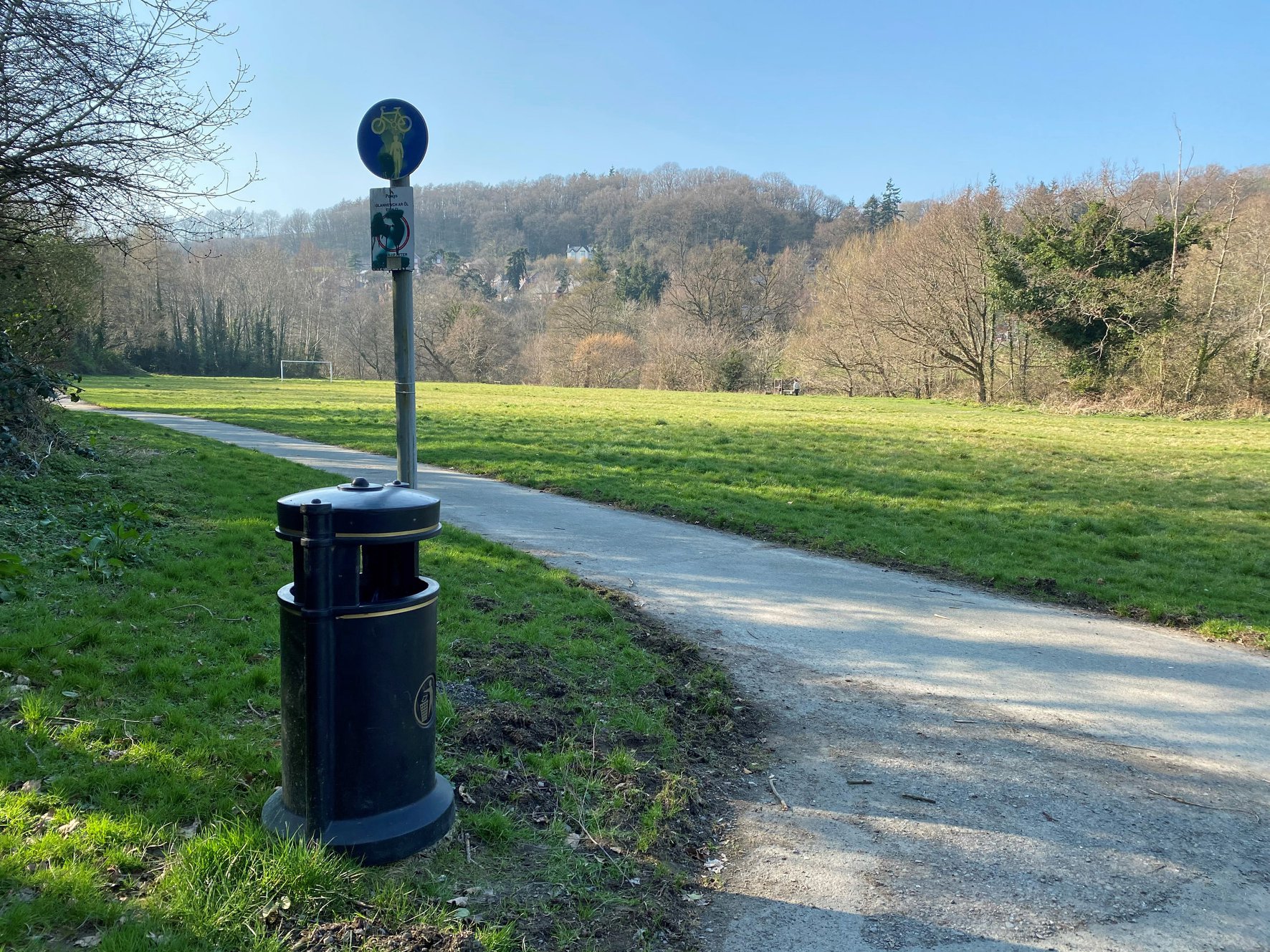Waste Management
Litter really is rubbish! Ideally everyone would take their rubbish home in an ethos of leave no trace, but we do understand that this isn’t always practical. We work hard with both on and off site contractors to ensure that waste collections meet the needs of park users. We have 15 bins on site and twice weekly collections – before and after the weekend). In line with council policy, if a bin is regularly vandalised or misused (filled with household waste for example) it may be removed. This will mean that there physically won’t be a bin there anymore. It also means it won’t be a collection point anymore. Anyone continuing to leave litter at this point is fly tipping and at risk of prosecution. Obviously, we want to avoid this and we welcome help from the public in keeping our green spaces clean and inviting for all.
The environment and sustainability are important to us. We intend to install new split wate bins to some high traffic areas of the park and hope that this will encourage people to recycle.
Everyone has an opinion on littering, bins and waste management. We understand that.
We take our advice from Keep Wales Tidy and the Powys Waste Management team, who have a vast amount more experience than any of us.
Various studies have been completed on the presence of bins.
Obviously bins encourage people to leave their litter, whereas no bins encourage people to take their litter away with them.
Ideally, people taking waste home will split and recycle too.
We welcome the act of ‘carry it in, carry it out’.
When in nature, leave no trace.
Respect, protect, enjoy.
All good slogans.
But people who litter will do so with or without the presence of bins. That’s their nature and it’s difficult to change their habits.
How often do you see litter dropped on the ground within line of sight of a bin? Too often.
Overflowing bins are another frustration. We hope that people would be sensible and not add waste to an already overflowing bin, but we often find that isn’t the case.
If the wrong bins are present then birds and animals may root amongst the waste, pulling out rubbish.
Over time we’d like to replace bins, to discourage animals and birds, but also to add recycling waste provision.
We adopted 14 bins through our community asset transfer, but some had seen better days.
These 14 bins were spread out over 130 acres, although most were concentrated on Dolerw Park.
We’ve repurposed a couple of bins to offer a better spread across the green spaces, to help those who need bins elsewhere.
In the past there have been fly tipping issues, with contractors waste and household waste deposited in public bins, which resulted in the bins being removed by Powys County Council.
We’d like to avoid this happening again, so we’ll be writing to households to explain who we are, how we’re funded and how our limited budgets are ideally spent on new local facilities and activities, rather than paying out large fees to address fly tipping and waste disposal.
It’s with pride that we’ve opened the BMX Pump Track area and seen a significant REDUCTION in the amount of litter.
This proves that the introduction of the right social events and activities keep the anti-social elements away.
Total respect to all of the youngsters and adults keeping these areas free of waste.
The introduction of new benches do not require the introduction of extra bins, especially so when there are already bins present.
We will not be installing bins where people litter, but instead we will be discouraging littering.
It’s worth pointing out that we don’t manage all of the bins in Newtown.
For example, bins at Gravel Car Park are managed by Powys County Council and Newtown and Llanllwchaiarn Town Council.
Some of these bins are emptied TWICE a day.
The presence of bins encourages people to use the them, obviously, but they’re often overflowing. It doesn’t matter how many bins are added, the problem gets worse.
Only when people change their habits will we tackle overflowing bins in our town.
Find a bin which isn’t overflowing.
Better still, take your waste home.
And recycle.
Dog waste. There’s a lot of it and it’s very heavy. It’s our highest waste disposal cost. So over time we may try to introduce new and innovative ways to dispose of dog waste, in a separate stream to the materials we plan to recycle. This will take time, money and joint collaboration with our regular dog walkers.
Signage has proven to be effective in changing habits. Over time we will introduce new signage, which will change regularly, to reflect improvements in the reduction of littering.
Long term our waste strategy plan with be developed and published, with the experience and support of our Park Ranger.
We will continue to work with KWT, PCC and our local litter picking champions to reduce and eliminate unsightly litter hot spots.
There is no overnight fix and we ask everyone to be patient as we develop and deliver our plans.
Stay up to date – join our newsletter!
Keep in touch – get involved – make a difference


